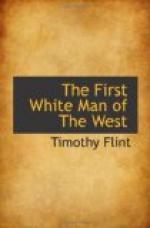Colonels Todd and Trigg, little acquainted with the Indians, were desirous to be guided by the judgment of Colonel Boone. His opinion being called for, he gave it with his usual clearness and circumspection. As regarded the number of the enemy, his judgment was, that it should be counted from three to five hundred. From the careless and leisurely manner of the march of the body, they had seen, he was aware, that the main body was near, and that the show of this small party was probably, with a view to draw on the attack, founded upon an entire ignorance of their numbers. With the localities of the country about the Licks, from his former residence there, he was perfectly acquainted. The river forms, by its curves, an irregular ellipsis, embracing the great ridge and buffalo road leading from the Licks. Its longest line of bisection leads towards Limestone, and is terminated by two ravines heading together in a point, and diverging thence in opposite directions to the river. In his view, it was probable that the Indians had formed an ambuscade behind these ravines, in a position as advantageous for them as it would be dangerous to the party, if they continued their march. He advised that the party should divide; the one half march up the Licking on the opposite side, and crossing at the mouth of a small branch, called Elk creek, fall over upon the eastern curve of the ravine; while the other half should take a position favorable for yielding them prompt co-operation in case of an attack. He demonstrated, that in this way the advantage of position might be taken from the enemy, and turned in their favor. He was decided and pressing, that if it was determined to attack a force superior, before the arrival of Colonel Logan, they ought at least to send out spies and explore the country before they marched the main body over the river.
This wise counsel of Colonel Boone was perfectly accordant with the views of Colonels Todd and Trigg, and of most of the persons consulted on the occasion. But while they were deliberating, Major McGary, patriotic, no doubt, in his intentions, but ardent, rash, hot-headed, and indocile to military rule, guided his horse into the edge of the river, raised the war-whoop in Kentucky style, and exclaimed, in a voice of gay confidence, “All those that are not cowards will follow me; I will show them where the Indians are!” Saying this, he spurred his horse into the water. One and another, under the impulse of such an appeal to their courage, dashed in after him. The council was thus broken up by force. A part caught the rash spirit by sympathy. The rest, who were disposed to listen to better counsels, were borne along, and their suggestions drowned in the general clamor. All counsel and command were at an end. And it is thus that many of the most important events of history have been determined.




